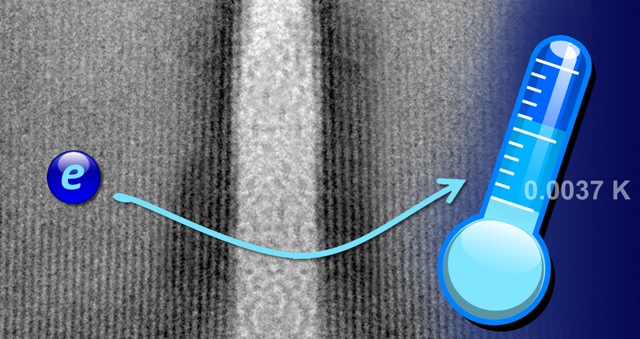Jan 28 2016
The first ever measurement of the temperature of electrons in a nanoelectronic device a few thousandths of a degree above absolute zero was demonstrated in a joint research project performed by VTT Technical Research Centre of Finland Ltd, Lancaster University, and Aivon Ltd. The team managed to make the electrons in a circuit on a silicon chip colder than had previously been achieved.
 Illustration of single-electron tunnelling through an oxide tunnel barrier in the primary thermometer device. The measured tunnel current is used in determining the absolute electron temperature.
Illustration of single-electron tunnelling through an oxide tunnel barrier in the primary thermometer device. The measured tunnel current is used in determining the absolute electron temperature.
Although it has long been possible to cool samples of bulk metals even below 1 millikelvin, it has proved very difficult to transfer this temperature to electrons in small electronic devices, mainly because the interaction between the conducting electrons and the crystal lattice becomes extremely weak at low temperatures. By combining state-of-the-art micro and nanofabrication and pioneering measurement approaches the research team realized ultralow electron temperatures reaching 3.7 millikelvin in a nanoelectronic electron tunnelling device. A scientific article on the subject was published in Nature Communications on 27 January 2016.
This breakthrough paves the way towards sub-millikelvin nanoelectronic circuits and is another step on the way to develop new quantum technologies including quantum computers and sensors. Quantum technologies use quantum mechanical effects to outperform any possible technology based only on classical physics. In general, many high sensitivity magnetic field sensors and radiation detectors require low temperatures simply to reduce detrimental thermal noise.
This work marks the creation of a key enabling technology which will facilitate R&D in nanoscience, solid-state physics, materials science and quantum technologies. The demonstrated nanoelectronic device is a so-called primary thermometer, i.e., a thermometer which requires no calibration. This makes the technology very attractive for low temperature instrumentation applications and metrology.
The breakthrough was made possible by bringing together internationally-leading groups and experts each of whom have their own track record of achievements in the fields of nanotechnologies and high performance sensors (VTT Technical Research Centre of Finland Ltd), custom low-noise electronics (Aivon Ltd, Finland) and ultralow temperature refrigeration and device characterization (Ultra Low Temperature Physics group and Quantum Technology Centre at Lancaster).
VTT is looking into possibilities together with BlueFors Cryogenics to commercialise the primary thermometer component.
Dr Mika Prunnila, Nanoelectronics Research Team Leader at VTT, said: "Creating a new measurement tool for calibration-free thermometry is a big step forward. This is an important device for quantum machines which need the low temperature environment in order to work and the device is available right now for benchmarking different systems."
Dr Rich Haley, Head of Ultra Low Temperature Physics at Lancaster, said: "This is a notable achievement in that the team has finally broken through the 4 millikelvin barrier, which has been the record in such structures for over 15 years."
Dr Jon Prance of the Lancaster Quantum Technology Centre said: "Not only have we measured the coldest ever nanoelectronics temperature, but we have also demonstrated techniques which open the door to even lower temperatures."
Article: Nature Communications, DOI: 10.1038/NCOMMS10455
Source: http://www.vttresearch.com/